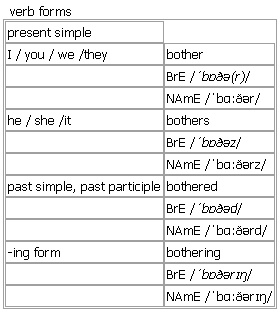|
Từ điển Oxford Advanced Learner 8th
 bother
bother

bother [bother bothers bothered bothering] verb, noun, exclamation BrE [ˈbɒðə(r)] NAmE [ˈbɑːðər]
verb
1. intransitive, transitive (often used in negative sentences and questions)to spend time and/or energy doing sth
• ‘Shall I wait?’ ‘No, don't bother’.
• I don't know why I bother! Nobody ever listens!
•If that's all the thanks I get, I won't bother in future!
•~ with/about sth It's not worth bothering with (= using) an umbrella— the car's just outside.
•I don't know why you bother with that crowd (= why you spend time with them).
•He doesn't bother much about his appearance.
•~ to do sth He didn't even bother to let me know he was coming.
•~ doing sth Why bother asking if you're not really interested?
2. transitive to annoy, worry or upset sb; to cause sb trouble or pain
•~ sb The thing that bothers me is…
• That sprained ankle is still bothering her (= hurting).
• ‘I'm sorry he was so rude to you.’ ‘It doesn't bother me.’
•~ sb with sth I don't want to bother her with my problems at the moment.
•be bothered about sth You don't sound too bothered about it.
•~ sb that… Does it bother you that she earns more than you?
•it bothers sb to do sth It bothers me to think of her alone in that big house.
3. transitive to interrupt sb; to talk to sb when they do not want to talk to you
•~ sb Stop bothering me when I'm working.
• Let me know if he bothers you again.
•Sorry to bother you, but there's a call for you on line two.
more at hot and bothered at ↑hot adj.
Verb forms: 
Word Origin:
late 17th cent. (as a noun in the dialect sense ‘noise, chatter’): of Anglo-Irish origin; probably related to Irish bodhaire ‘noise’, bodhraim ‘deafen, annoy’. The verb (originally dialect) meant ‘confuse with noise’ in the early 18th cent.
Thesaurus:
bother verb
1. T
•The noise doesn't bother me.
worry • • disturb • • trouble • • concern • • unsettle • • alarm •
It bothers/worries/disturbs/troubles/concerns/alarms sb that…
Is there something bothering/worrying/disturbing/troubling you?
bother/worry/trouble/concern sb with sth
bother/worry/trouble/concern yourself about sth
Which word? Bother is the most informal of these words, especially in spoken phrases such as It doesn't bother me and I'm not bothered. Concern is the most formal and not usually used in the progressive tenses.
2. T (especially spoken)
•Sorry to bother you.
disturb • • interrupt • |formal trouble •
bother/disturb/interrupt/trouble sb with sth
be sorry to bother/disturb/interrupt/trouble sb
Bother, disturb or interrupt? You can bother or disturb sb who is trying to do sth by talking to them. You interrupt sb who is speaking by speaking yourself. You can also disturb sb by making a lot of noise.
Example Bank:
•‘I'm sorry he was so rude to you.’ ‘It doesn't bother me.’
•Please stop bothering me with all these questions!
•Sorry to bother you, but there's a call for you on line two.
•Stop bothering me when I'm working.
Idioms: ↑bothered ▪ ↑can't be bothered ▪ ↑not bother your head with something
noun
1. uncountable trouble or difficulty
•You seem to have got yourself into a spot of bother.
•I don't want to put you to any bother (= cause you any trouble).
•Don't go to the bother of tidying up on my account (= don't make the effort to do it).
•‘Thanks for your help!’ ‘It was no bother.’
•Call them and save yourself the bother of going round.
•I don't mind looking after the children; they aren't any bother.
•She's been having a bit of bother with her car.
2. a bothersingular (BrE)an annoying situation, thing or person
Syn: ↑nuisance
•I hope I haven't been a bother.
Word Origin:
late 17th cent. (as a noun in the dialect sense ‘noise, chatter’): of Anglo-Irish origin; probably related to Irish bodhaire ‘noise’, bodhraim ‘deafen, annoy’. The verb (originally dialect) meant ‘confuse with noise’ in the early 18th cent.
Example Bank:
•He's got a spot of bother with his eyes.
•He's having a little bother with his computer.
•He's in a bit of bother with the police.
•I don't mind looking after your dog— it's no bother to me.
•I had a little bother finding your house.
•I wouldn't go to the bother of making the cakes myself.
•I'd love to come and stay with you, but I don't want to put you to any bother.
•It was no bother having the children to stay.
•The children were no bother.
•We found the hotel without any bother.
•Your little boy didn't give me any bother.
•Don't go to the bother of tidying up on my account.
•I don't mind looking after the children; they aren't any bother.
•I don't want to put you to any bother.
•She's having a bit of bother with her car.
•You seem to have got yourself into a spot of bother.
exclamation (BrE)used to express the fact that you are annoyed about sth/sb
• Bother! I've left my wallet at home.
• Oh, bother him! He's never around when you need him.
Word Origin:
late 17th cent. (as a noun in the dialect sense ‘noise, chatter’): of Anglo-Irish origin; probably related to Irish bodhaire ‘noise’, bodhraim ‘deafen, annoy’. The verb (originally dialect) meant ‘confuse with noise’ in the early 18th cent.
|
|
|
▼ Từ liên quan / Related words
Related search result for "bother"
|
|
